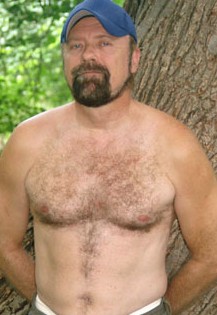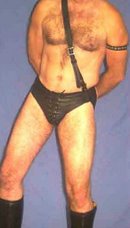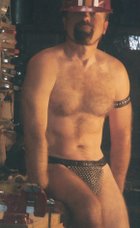
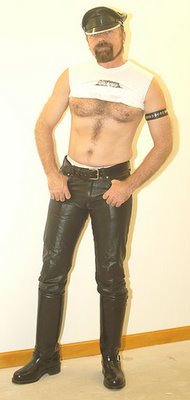
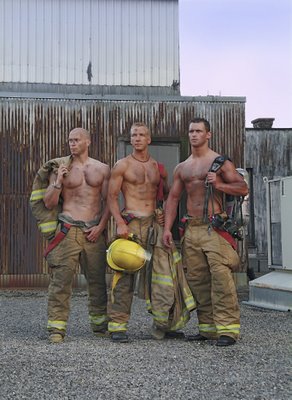
I have visited this topic on several occasions. Below is a report from a recent CBS edition of "60 Minutes" conducted by correspondent Lesley Stall:
Psychologists used to believe homosexuality was caused by nurture — namely overbearing mothers and distant fathers — but that theory has been disproved. Today, scientists are looking at genes, environment, brain structure and hormones. There is one area of consensus: that homosexuality involves more than just sexual behavior; it's physiological.
Dr. Bailey , a noted sex researcher, and his colleagues set up a series of experiments in his lab at Northwestern University. In one study, researcher Gerulf Rieger videotaped gay and straight people sitting in a chair, talking. He then reduced them visually to silent black and white outlined figures and asked volunteers to see if they could tell gay from straight. The idea was to find out if certain stereotypes were real and observable. Based on physical movement and gestures of the figures, more often than not, the volunteers in the study could tell a difference. "So, is the conclusion that gay people do in fact move differently?" Stahl asked Rieger. "Yeah, absolutely," he replied. It's not true 100 percent of the time; it is true on average. The researchers also studied the way gay and straight people talk, and they found differences on average there too. This research is controversial. Some say it is reinforcing stereotypes. But to Bailey, the stereotypes suggest there's a feminizing of the brain in gay men, and masculinizing in lesbians.
Ironically though, when it comes to their sex lives, he says gay and straight men actually have a lot in common. "Straight men tend to be shallow in terms of focusing on looks. Gay men are shallow, too. Straight men are more interested than straight women in having casual, uncommitted sex. Gay men are like that, too," says Bailey.
"One has the impression that gay men are much more inclined toward casual sex than straight men," Stahl said. "They're just more successful at it, because the people they're trying to have sex with are also interested in it," Bailey explained. "But don't you find this interesting that the one big area where gay men are more like straight men is in sex? I mean, that is…both amusing and odd," Stahl said. "It suggests that whatever causes a man to be gay doesn't make him feminine in every respect. There must be different parts of the brain that can be feminized independently from each other," Bailey replied.
But how and when does this feminizing occur? If the differences were already apparent in childhood, that would point to an early, perhaps even genetic origin — and that's what Bailey and Rieger are testing in a new study using childhood home movies. In the study, volunteers were asked to rate each child's femininity or masculinity. Stahl took the test and rated two girls highly feminine. When shown video of a toddler girl running a truck off of a table, Stahl observed, "She's really not girly. Isn't that interesting? She's not girly." She also observed differences in two boys, one of whom would grow up to be straight, while the other is now gay. If you can spot a child's future sexual orientation before the child even knows he or she has one, doesn't that prove it's genetic? Studies have shown that homosexuality runs in families. So genes must be the answer. But then the researchers tell you identical twins can have different sexual orientations.
60 Minutes found identical twins Steve and Greg Lofts in New York. They had the same upbringing, have the same DNA — and yet Greg is gay and Steve is straight. When people meet the twins and find out one of them is gay, Greg says people have asked if he's sure, and how it can be. "Everyone is curious about that," he says. There were signs, even when they were little kids. Their mother told Stahl that Steve loved sports and the outdoors while Greg liked helping out in the kitchen. But it wasn't until high school that Steve became convinced Greg was gay. Asked if he said anything to his brother, Steve says, "I did actually. And I think the way I worded it was something like, 'You know, Greg, if you're gay, it's OK with me. And I'll still love you the same.' And he gave a very philosophical answer. He said something like, 'Well, I love the soul of a person and not the physical being.' And in my mind, I was like, 'Yep, he's gay.'" "I wasn't ready just yet," Greg added. ",
Does this prove that it's not genetic? "What it proves is it's not completely genetic. They have the same genes," says Bailey. Asked if that brings us back to the mother and the father, Bailey says no. "But that's environment," Stahl said. "That's environment. But that's not the only environment. There's also the environment that happens to us while we're in the womb. And scientists are realizing that environment is much more important than we ever thought it was," Bailey explained.
A newborn rat pup in the lab of Dr. Marc Breedlove at Michigan State University, may, oddly enough, hold important clues to what happens in the womb. Dr. Breedlove says he can take a male rat and make it behave like a female for the rest of its life, and vice versa for a female, just by altering the hormones it's exposed to at birth. Because rats are born underdeveloped, that's roughly the same as altering a third-trimester human fetus in the womb. But first, he said, Stahl would need a crash course in rat sex. Dr. Breedlove explained that male rats, including one he showed Stahl called "Romeo," will mount any rat that comes their way. In the mating process, the female performs something called lordosis, where she lifts her head and rump. If Romeo goes after a male, Dr. Breedlove says the male will seem profoundly indifferent. But Breedlove says he can change all that. He gave a female rat a single shot of the male sex hormone testosterone at birth. Now grown up, she will never perform lordosis. But a male rat did. He was castrated at birth, depriving him of testosterone. "So you created a gay rat?" Stahl asked. "I wouldn't say that these are gay rats. But I will say that these are genetic male rats who are showing much more feminine behavior," he explained. So the answer may be that it's not genes but hormones. "That's exactly the question that we're all wondering. This business of testosterone having such a profound influence. Does that have some relevance to humans?" Breedlove said.
While biologists look at hormones for answers about human sexuality, other scientists are looking for patterns in statistics. And hard as this is to believe, they have found something they call "the older brother effect." "The more older brothers a man has, the greater that man's chance of being gay," says Bailey. Asked if that's true, Bailey says, "That is absolutely true." If this comes as a shock to you, you're not alone. But it turns out, it's one of the most solid findings in this field, demonstrated in study after study. And the numbers are significant: for every older brother a man has, his chances of being gay increase by one third. Older sisters make no difference, and there's no corresponding effect for lesbians.
A first-born son has about a 2 percent chance of being gay, and the numbers rise from there. The theory is it happens in the womb. "Somehow, the mother's body is remembering how many boys she's carried before," says Breedlove. "The favorite hypothesis is that the mother may be making antibodies when she sees a boy the first time, and then affect subsequent boys when she carries them in utero." "You mean, like she's carrying a foreign substance?" Stahl asked. "And if you think about it, a woman who's carrying a son for the first time, she is carrying a foreign substance," Breedlove replied. "There are some proteins encoded on his Y chromosome that her body has never seen before and that her immune system would be expected to regard as 'invaders,'" he added. It's still not a proven theory and it gets even stranger. "One of the things we've only found out lately is that older brothers affect a boy only if the boy is right-handed," Breedlove said. "If the boy is left-handed, if his brain is organized in a left-handed fashion, it doesn\t matter how many older brothers he has, his probability of being gay is just like the rest of the population."
I'm right handed and first born, with no other brothers.
You can give yourself a headache trying to apply all the theories to real people. Greg and Steve Lofts both are right-handed, and they do have an older brother, so maybe that's why Greg is gay. But they also have several gay relatives, which suggests it could be in the genes, except where does that leave Steve? Adam and Jared, fraternal twins, have older brothers, but they're ambidextrous. Then there's the question of how something in the womb could affect one twin but not the other. There are many more questions at this point than answers, but the scientists
60 Minutes spoke to are increasingly convinced that genes, hormones, or both — that something is happening to determine sexual orientation before birth. Adam has come up with his own theory. "I was supposed to be a girl in my mom's stomach. But my mom wished for all boys. So, I turned into a boy," Adam explained. Asked if he wished he was a girl, Adam nodded. "Do you think there was anything that you could have done that would have changed Adam?" Stahl asked Adam and Jared's mom Danielle. "I could have changed Adam on the outside to where he would have showed me the macho boy that I would want as a boy. But that would not change who he is inside. And I think that would have damaged him a lot more," she said. Stahl asked both boys if they are proud of the way they are, and both boys gave her big nods. "Yup," Adam replied. More at: http://
www.cbs.comYep, I agree with Adam. And I know each and everyone of you are proud to be gay men and never regretted it for a day. Big hairy muscle hugs. You guys are the best.










